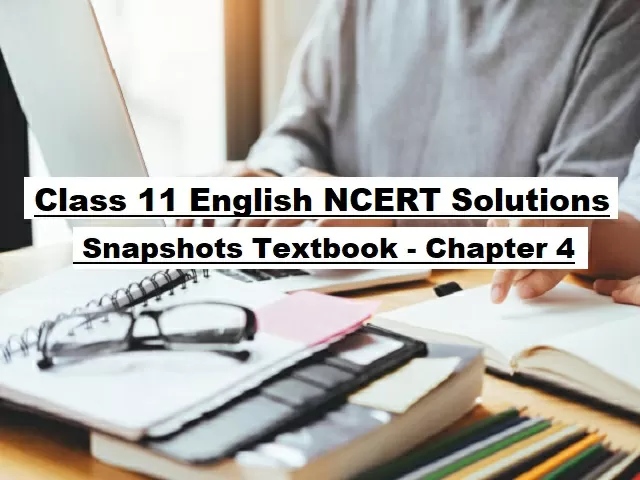Get Class 11th NCERT Solutions for Chapter 4 from the English Snapshots Textbook. The NCERT solutions of this chapter have been provided after a detailed analysis of the latest syllabus issued by CBSE. Students of Class 11th can study the answers provided here to score well in their school exams.
NCERT Solutions for Class 11 English (Hornbill Textbook): Poetry - All Chapters
NCERT Solutions for Class 11 English Snapshots Textbook - Chapter 4
Ques: What do you understand of Einstein’s nature from his conversations with his history teacher, his mathematics teacher and the headteacher?
Answer: Exchanges between Einstein and History teacher show that Einstein is honest and truthful. He admits his shortcomings frankly. He has firm and well-defined opinions. He explains precisely what he thinks. Thus his basic intelligence, logical reasoning, and lucid expression are highlighted. He showed the sparks of genius even at a young age. His maths teacher had a high opinion of him. He went to the extent of saying: “I can’t teach you more, and probably you’ll soon be able to teach me.” When Albert said that it was excessive praise, the teacher acknowledged that it was only the truth. He made the point by saying that Albert was ready immediately to enter a college or institute for the study of higher mathematics. Albert himself said, “I’ve learned all the maths, they teach at school and a bit more.”
The headteacher told Albert that he was expelling him from school because his presence in the classroom made it impossible for the teacher to teach and other pupils to learn. No serious work could be done while he was in class. Albert refused to learn and he was” in constant rebellion.
For a moment Albert felt tempted to tell the headteacher what he thought of him and his school. Then he stopped himself. He didn’t say even a single word. Holding his head high, he went out with a sense of pride. Thus, he had a lot of self-control. Albert was not at all impolite. He addressed his teachers respectfully and answered the questions honestly.
Ques: The school system often curbs individual talents. Discuss.
Answer: Albert Einstein’s miserable five years’ stay at school is a telling comment on the system of education prevailing then and existing even now. This system of education has no room for individual aspirations, brilliance, or aptitude. It discourages genius and originality and encourages mechanical dullards or the so-called ‘average’ students. This system lays stress on facts and dates rather than ideas. It ignores originality and creativity, which leads to progress and development.
No wonder then that most of the students manage to pass the examination by cramming—learning things by heart and repeating it in the exams. This parrot-like learning or learning without understanding may help to get the diploma but fails to enrich the mind or inculcate ideas.
The teachers and authorities insist on discipline and conformity. The history teacher and the Headteacher are sticklers for rules, pedagogy, and discipline. Brilliant students like Albert Einstein are considered dullard, stupid, incompetent, unfit rebels whose very presence makes it impossible for the teacher to teach and other pupils to learn.
Ques: How do you distinguish between information gathering and insight formation?
Answer: Learning the dates of battles or the details about victorious armies are facts. These details are part of knowledge which are content-based. There is no point in spending precious years of student life on information gathering because dates or facts could be ascertained from the books any time by just looking them up. Learning facts or parrot-like learning i.e., learning without understanding is what we call information gathering.
Analyzing the facts, ascertaining the causes that led to a certain incident such as an uprising or a war, and learning the ideas that spring from such actions are part of insight information. It gives us a clear perception of the true nature of a thing. Such knowledge increases our logical reasoning, power of analysis interpretation, and understanding and makes us think.
NCERT Solutions for Class 11 English: Hornbill (Prose) - All Chapters
